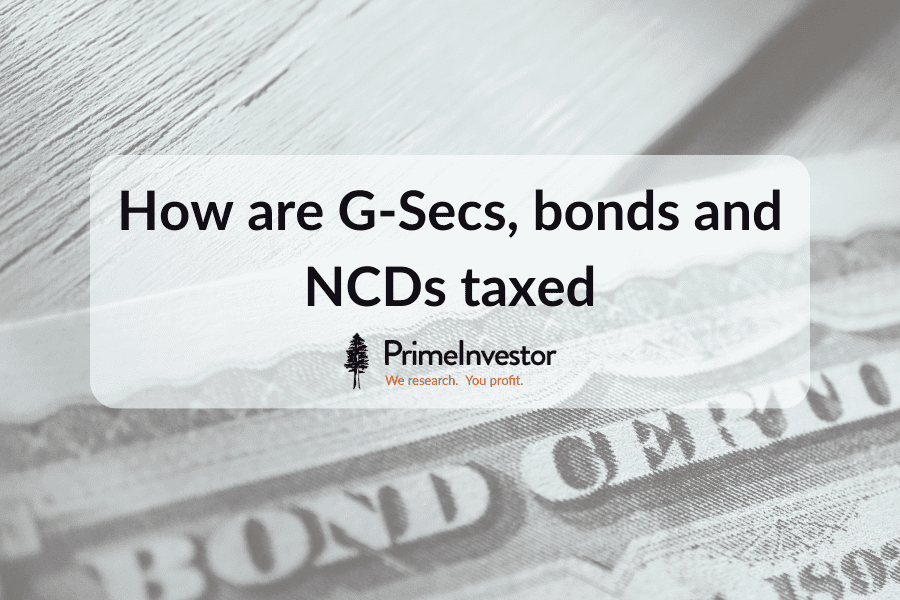While investing in bonds is not new to retail investors, things have really started to take off for bond markets in the last couple of years. A surge in bonds being sold online, without the depth of regulation that they needed, resulted in SEBI’s regulations for Online Bond Platform Providers or OBPP in late 2022.
These regulations in a nutshell said that OBPPs would be companies incorporated in India, registered as stock brokers in the debt segment of the stock exchanges. These OBPPs are only allowed to sell bonds that are listed, to be listed or Government securities. OBPPs are also not allowed to sell any other securities.
Apart from OBPPs, there are also brokers that operate under a broker license of SEBI that you can buy bonds from and other bond platforms (not governed by SEBI and offering less formal avenues to invest in debt like bill discounting and small business loans). The OBPP route (platforms such as BondsIndia, GoldenPi and IndiaBonds to just give some examples) is PrimeInvestor’s preferred route to investing in bonds and NCDs and you can watch this video to know why.
With the regulation of OBPPs and the advent of RBI Retail direct in late 2021 (5 steps to buy G secs on the RBI Retail Direct Platform), retail investors have easy access to well regulated avenues to get debt in their portfolios.
This compounded by the change in debt fund regulations last year (Tax change in mutual funds – how to manage your investments now), builds the case for taking the OBPP and RBI Retail Direct routes to getting some fixed income in your portfolio.
This blog will look at one of the key factors that we look at when we consider any investment avenue – taxation.

As you already know, bonds or non-convertible debentures (NCDs) provide income in the form of periodic interest payouts and in the form of capital gains at the time of transfer / redemption. This blog will therefore deal with
- taxation of the interest income,
- capital gains tax and
- additionally, the tax deducted at source or TDS component of the various types of bonds.
Let’s dive in!
Tax Rates
Here are the tax rates that are relevant to taxation of bonds.
TDS on Interest
As per section 193 of the Income Tax Act, 1961, where applicable, 10% tax will be deducted at source on interest payments if your PAN and aadhar are linked and you are a resident Indian.
Interest income
Interest will be clubbed under the head ‘Income from other sources’ and taxed at the normal rate determined on the basis of the taxable income of the tax payer.
Capital Gains
- The holding period to determine whether capital gains are long or short term is 12 months in the case of listed securities and 36 months in the case of unlisted securities.
- Long term capital gains on listed bonds will be at the rate of 10%. For unlisted bonds this will be 20%.
- Short term capital gains are charged to tax at normal rate of tax which is determined on the basis of the total taxable income of the taxpayer.
- Indexation benefit applies only to capital indexed bonds and SGBs as per section 48 of the Income Tax Act, 1961.
- In the case of bonds where indexation benefit is available and has been availed, long term capital gains will be taxed at 20%. If indexation benefit has not been availed, the same will be taxed at 10%.
Bonds issued by the Government
According to the RBI, ‘A Government Security (G-Sec) is a tradeable instrument issued by the Central Government or the State Governments. It acknowledges the Government’s debt obligation. Such securities are short term (usually called treasury bills, with original maturities of less than one year) or long term (usually called Government bonds or dated securities with original maturity of one year or more). In India, the Central Government issues both, treasury bills and bonds or dated securities while the State Governments issue only bonds or dated securities, which are called the State Development Loans (SDLs). G-Secs carry practically no risk of default and, hence, are called risk-free gilt-edged instruments.’
While G-secs are issued to meet the funding requirements of the Government, they also set the tone for the overall debt market and act as a benchmark for the risk-free rate due to the sovereign guarantee that they come with. Here is the tax treatment of G-secs.
#1 T-Bills
As mentioned above, T-bills are short term debt instruments (money market instruments) issued by the Government of India, have maturities of less than a year and are presently issued in three tenors – 91 day, 182 day and 364 day.
These bonds make no coupon payouts but are issued at a discount (also known as zero coupon bonds). At maturity, the investor will be paid back the face value of the bond. Yield is arrived at on the basis of the discount rate at which it is sold.
Taxation: The difference between the purchase price and the redemption value would be taxed as per the tax slab applicable.
#2 G-secs or dated securities
These have tenures ranging from 1 year to 40 years. They could come with fixed or floating rate interest. The coupon / interest payouts are made half yearly with no cumulative option.
Taxation of interest income: The interest income is to be clubbed with the investor’s income and taxed as per his / her applicable slab rate.
TDS: Tax is not deducted at source on interest payments.
Capital gains:
- If the bond was purchased at face value in the primary market and held to maturity, the question of capital gains would not arise.
- However, if the bond has been bought and / or sold on the secondary market, the difference between the sale price and the purchase price would be capital gains.
- Long term capital gains (holding period over 12 months) would be taxed at 10% with no indexation benefit.
- Short term capital gains would be taxed as per the investor’s slab rate.
#3 State Development Loans (SDL)
SDLs represent borrowings of the State Governments and Union Territories. These are issued for tenures of 1 year to 40 years. While SDLs don’t come with an explicit sovereign guarantee that T-bills and G-secs come with, they are the next best thing and you can read more about SDLs here.
Taxation of interest income: Like G-secs, SDLs too make half yearly coupon payments with no cumulative option. These coupon payments are taxable at the slab rate applicable to you.
TDS: Tax will not be deducted at source on coupon payments.
Capital gains: Capital gains would be taxed in the same way as G-secs.
#4 Sovereign Gold Bonds (SGB)
In addition to the above, SGBs are also issued by the RBI and offer a way to invest in gold minus the hassles of physical storage. These were launched in 2015 and come with a tenure of 8 years. Investors are allowed an early redemption from the 5th year onwards. Issue and redemption prices of these bonds are linked to prevailing gold prices. If held in demat form, these bonds are tradeable on an exchange (whether they are actually traded depends on the liquidity of the instrument). The bonds can also be transferred to another investor subject to some eligibility criteria. A detailed FAQ on SGBs can be found on the RBI website here.
Taxation of interest income: SGBs make half yearly interest payouts (fixed rate which is currently 2.5%) and this is taxable at the hands of the investor based on the slab rates applicable.
TDS: Tax will not be deducted on this interest payout.
Capital gains:
- The capital gains arising at redemption of these bonds have been exempt from tax if held to maturity.
- One thing to note is that, in the case of transfer of these bonds, the resulting long term capital gains are allowed to be reduced via indexation benefits before being taxed at 20%.
- Short term capital gains (held for less than 12 months) will be taxed at the slab rate applicable to the investor.
Corporate Bonds
Listed corporate bonds
Fixed income instruments issued by corporations (companies, banks, NBFCs micro finance companies and other financial companies) and are traded fall under this category. These would carry a higher rate of interest than Government securities to compensate for the relatively higher risk they carry. These bonds could come with fixed or variable coupon rates. While there are several variants of listed corporate bonds, the interest income and capital gains arising out of them are taxed as follows:
Taxation of interest income: The interest on listed corporate bonds is taxable in the hands of the bond holder at the slab rate applicable.
TDS: While section 193(ix) of the Income Tax Act used to grant an exemption of TDS on interest payments where the bonds are listed and held in demat form, this exemption was removed from April 1, 2023 (Budget 2023). This means that TDS will now be applicable.
Capital gains:
- Capital gains on listed corporate bonds are taxable. Since these are listed securities, a holding period greater than 12 months would mean the gains are long term capital gains. These are taxed at 10% without indexation benefit.
- Short term capital gains are taxed as per the investor’s applicable slab rate.
Tax-free Bonds
These are bonds that were specially issued by PSUs like REC, PFC, NHAI and HUDCO.
Taxation of interest income & TDS: The interest on these tax free bonds are tax free under section 10 of the Income Tax Act and hence there is no TDS on the interest payouts either.
Capital gains: These bonds are limited in availability and are available on the secondary market for their residual maturities. Capital gains on the sale of these bonds would however, be taxable in the same way as listed corporate bonds.
Unlisted Bonds
Taxation of interest income: The interest income on bonds that are not listed on an exchange would be taxed in the same way (at the slab rate applicable to the investor).
Capital gains: Capital gains tax differs on account of a longer holding period requirement for classification as long term capital gains for unlisted securities. If the holding period is less than 36 months, the gains would be short term capital gains that are taxed at the investor’s slab rate. If the holding period was over 36 months, the gains would be taxed at 20% without indexation benefits.
Non-transferable bonds
54 EC Bonds
Popularly known as capital gains bonds, these are used to set off long term capital gains against the investment in these bonds. Certain bonds (issued by REC, NHAI, PFC and IRFC) are earmarked as eligible under section 54EC of the Income Tax for this purpose. These bonds come with a lock-in of 5 years and are not transferable.
Taxability: Given their lock-in, the only income stream from these bonds is by way of interest. This is fully taxable as per the applicable slab rates. However, no tax will be deducted at source on the interest payouts.
RBI Floating Rate Savings Bonds 2020
These are a floating rate debt instrument issued by the Government and comes with a sovereign guarantee. The rate of interest is reset every six months and is tied to the NSC rate + a markup of 35 basis points.
Taxability: The interest is paid out half yearly. These bonds come with a 7-year lock in with early redemption being allowed for senior citizens. You can read more about these bonds in our earlier article here. Since these bonds are not traded or transferable, the question of capital gains does not arise. The interest on these bonds is taxable as per the applicable slab rate and tax will be deducted at source on the same at 10%.







15 thoughts on “How are G-Secs, bonds and NCDs taxed ”
There is one case that you have not considered. You write “If the bond was purchased at face value in the primary market and held to maturity, the question of capital gains would not arise.”
If you consider the case of G-Secs, these bonds are issued in the primary market at a premium or discount. The purchase price in the secondary market might also be higher or lower than the face value. If I then hold a bond till maturity, that would mean that I a capital loss or gain will be incurred depending on the price difference between purchase price and face value (which is the maturity price). Would you concur with this?
Sir this has been covered in the next point.
For the case of G-Secs you write that “Long term capital gains (holding period over 12 months) would be taxed at 10% with no indexation benefit. ” Under what section? Section 112A should not be applicable here since it is not an equity share.
Sir, please refer to this document.
Hope this clarifies.
Thanks
No, it does not clarify. On Page 8 of the document you have linked to, it mentions that a concessional rate of 10% applies only for equity shares or equity oriented funds, not government bonds. (This is the provision of section 112A). So the clarification I wanted is whether section 112A applies for government securities or not? My interpretation is that section 112A should not apply to government bonds and thereby the long term capital gains tax rate will not be 10% but 20% after indexation benefit.
Sir,
Please refer to the below sections.
Section 2(42A) that defines a short term capital asset to be one held for not more than 36 months except in the case of a listed security in which case it would be 12 months.
Section 45 defines capital gains.
Section 48 covers indexation. The fourth proviso will tell you which types of bonds indexation applies to.
Section 112 first proviso says that where tax is payable on income arising from the transfer of a long term capital asset being listed securities other than a unit or a zero coupon bond, exceeds 10% of the amount of capital gains before giving effect to the provisions of the second proviso to section 48 (indexation), then such excess shall be ignored for the purpose of computing the tax payable by the assessee.
Thanks
Understood. Thanks!
one clarification needed regarding SGB .If one buys SGB from secondary market and hold till maturity will they be exempt from capital gain tax?
There is no clarity on this whether from the tax dept or RBI
Can you do a similar article on deep discount bonds/ G sec c strip( zero coupon)?
Hello
When you buy corporate bonds/Gsec through Bond platform contract note gives details of accrued interest.
I take following example as an illustration
1. If you paid Rs 10,000 as accrued interest and if you get interest on bond of Rs 50000, in your income tax return you have to pay tax on Rs 50000 or Rs 40000 ie after deducting accrued interest?
2. Since there will deduction of TDS @10%(Pan registered), you will show TDS credit on Rs 50000 ie Rs 5000 or Rs 4000?
3. If you show interest and tds entry after accrued interest effect, there will be mis match between your figure and AIS(26AS).
4 When bond redemption /maturity occurs CG will be calculated on what sales proceedings you receive and your purchase price where once again accrued interest component will be there.
I checked with Bond Platforms who say that you have to pay interest on gross int less accrued int but they are clue less about reconciliation with 26AS in that case. They are not able to support with Income Tax Dept circular.
An article in MINT also supports above but is clue silent about mis match with 26AS.
However one of the CA who writes a blog mentions that you have to ignore accrued interest effect while calculating interest for return purpose and pay tax on gross interest which seems ill logical but no explanation on that.
Can you clarify above points.
I am filing my returns on y own and hence quite keen to know. I will not treat this as tax advice
For CG at redemption/maturity time sales proceeds- purchase value =CG according to him
Sir,
Please do talk to your tax consultant on this.
Thanks,
Dear Ms Pavithra,
1. Simple and well written. Thanks.
2. Investment in T-Bills / RBI floating rate 2020 bonds / G-Secs is beneficial through SBI Constant Maturity Fund / HDFC ST / Axis ST /ICICI ST Funds or on RBI retail platform for Senior Citizens?
Regards
Rajiv Kumar Mendiratta
Hello Sir, – no they are not the same. For income – it is good to hold them directly. Active management can get it wrong sometimes, much as they do get it right as well. So if you want stability of income, it is best to invest directly. Vidya
Thank you for the Write up PI team. Will be of immense benefit to explicitly cater to OCI & NRI investors as the eligibility/taxation/TDS will vary.
Comments are closed.